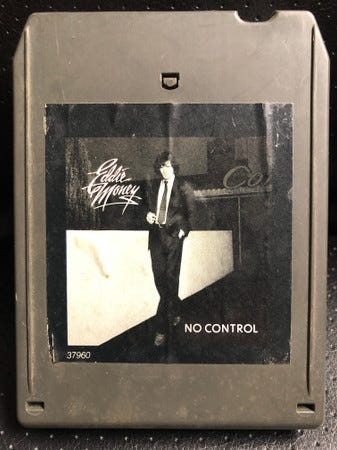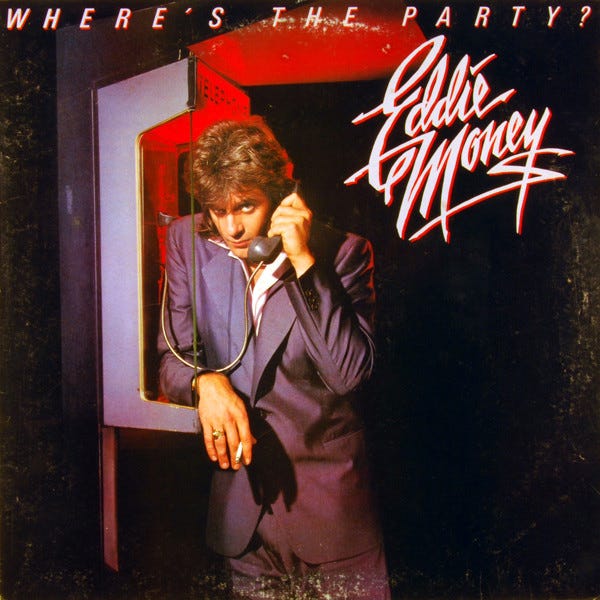The Man With No Control
Flashing back to my amazing 1999 interview with Eddie Money
It’s time, people.
The immortal 1999 interview I did with Eddie Money has been sitting in my archives for the past year and a half, just waiting for its chance to see the light of day here at Jagged Time Lapse. And now, thanks to the incredibly positive response to last month’s Money-related post, if finally feels right to share the interview with my paid subscribers…
I have interviewed countless musicians over the last thirty-plus years. Many of those conversations have faded entirely from my memory, while some (like the ones with David Lee Roth, Ernie Isley, Angus Young, Bobby Womack or Lemmy) will remain with me forever. But if you were to ask me to pick my all time favorite phone interview, I would have to go with Eddie Money. And if you dare to read on, you’ll totally understand why.
I interviewed the Money Man in the spring of 1999 for BAM magazine, which suddenly folded before the piece could run. (Just one of countless freelance outlets that have been shot out from under me over the years, which is one of the reasons I finally started this Substack in the first place.) My friend Jake Austen ran the interview a year or so later in his amazing ‘zine Roctober, and it resurfaced a few times over the years on my old blogs. But now it’s been a good decade or so since anyone has seen it; and once you’ve seen it, I promise that you’ll never forget it — even if you might prefer to.
So here’s the whole thing, complete with my original Roctober intro; I’ve made a few new tweaks and additions — partly in acknowledgement of the sad fact that Mr. Mahoney is no longer with us — and I’m going to run it in multiple parts, because it’s way too long to fit into one Substack newsletter. Part 2 will run sometime next week…
Looking back, I think it was sometime during the brutally hot Chicago summer of 1990 that I experienced my Eddie Money epiphany. My friend and Lava Sutra bandmate Bob were trudging drunkenly up Clark Street after yet another evening of intensive imbibery at the Wrigleyville Tap, when we decided to pick up some beer and junk food from the White Hen Pantry across from Graceland Cemetery.
As I stood woozily in the convenience store’s refrigerated aisle, pondering the relative merits of a frozen pizza and a tube of chocolate chip cookie dough, Eddie Money’s 1982 hit “Think I’m In Love” came on over the store’s radio and promptly blew my mind.
Okay, I’ll admit that I was also pretty stoned at this particular moment. But for the first time in my life, I truly understood the appeal of this jowly, hoarse-voiced, semi-spasmodic dude who had nonetheless somehow managed to sustain a lucrative singing career for decades: Namely, that he was the living embodiment of the Über-Schlub, the modern-day inverse of Friedrich Wilhelm Nietzsche’s idealized superman.
Sure, “Two Tickets to Paradise,” “Baby Hold On,” “Take Me Home Tonight” and most of Eddie’s other hits were punchy, competently delivered blasts of FM rock; but it was the mush-mouthed persona of the man born Edward Mahoney that really elevated them beyond their basic level of bar-band adequacy.
Think about it: Eddie Money shared the same working-class roots and record-buying demographic as Bruce Springsteen, Bob Seger and John Mellencamp, yet possessed absolutely none of the pretense or sense of self-importance that those guys often exhibited. A man of limited education, who never wanted to be anything other than a rock star, Eddie never presumed to speak for Nam vets, Detroit auto workers, or American farmers. Partying, screwing, and screwing up were the subjects Eddie knew best, which is why they consistently reappeared over the course of his discography.
And if Springsteen, Seger and Mellencamp are seen as larger than life by their fans, Eddie’s fans loved him because he was exactly the same size as life; he understood that he was just an average mook who got lucky, and his fans instinctively understood that he understood that. I mean, would you have ever asked Eddie Money for advice? Hell, no — if you were friends with him, he’d probably the one hitting you up for advice… not to mention a drink, a loan, or a place to crash.
Which was, of course, all part of that irresistible “Money Man” charm. That, and the persona he crafted (or, more accurately, staggered into) as “The Man With No Control,” a nickname which referenced one of his top-selling albums (1982’s No Control) as well as Eddie’s legendary inability to turn down any proffered substance or sexual favor.
Rumors circulated for years that the man’s bizarre side-of-the-mouth singing style was the result of a coke-induced stroke, and no wonder — songs like “Can’t Keep a Good Man Down,” “Two Tickets to Paradise” and “No Control” (which opens with the immortal line, “Well, they took me to the hospital”) painted an image of a guy who lived solely for pleasure, a man who might pass out after doing more lines, shots or beer bongs than you thought humanly possible, but who would inevitably be up again the next night with a shit-eating grin on his face and one thing on his mind: “Where’s the party?”




